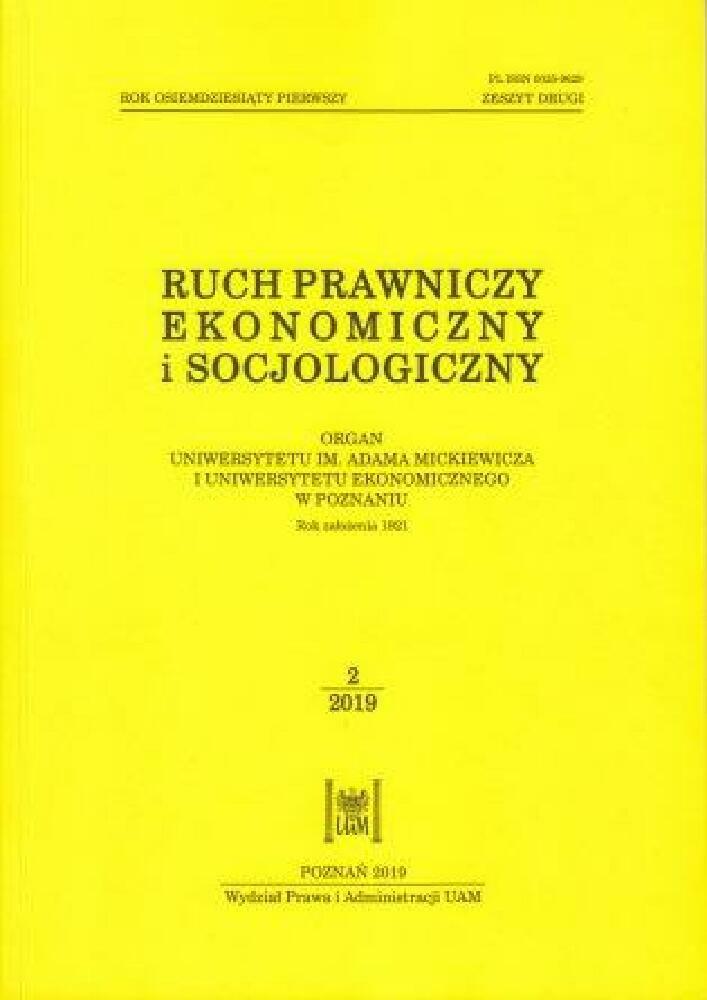Abstract
The article examines the specific correlation (interdependence) between the identification and intentional explanation of conventional acts (in particular, legally significant conventional acts). The author describes this interdependence as ‘constitutive’ because in this case intentional explanation plays a constitutive role for the identification of a conventional act. This can be expressed through the formula: ‘person P performed conventional act CA1’ only if ‘person P performed conventional act CA1 because person P was driven by the intention to perform conventional act CA1.’ The article analyses the logical and argumentative structure of the abovementioned correlation. On the basis of the analysis, the author claims that a constitutive correlation indicates that a relevant intention should be perceived as an element of the act itself (in contrast to the view adopted in the theory of conventional acts) and that verification rules relevant for the given act exist alongside the constitutive rules. Recognizing the relevant intention as an element of the conventional act stands in opposition to causalism, which treats intentions as the causes of actions.References
Anscombe, G.E.M. (1983). The causation of action, [w:] C. Ginet, S. Shoemaker (eds.), Knowledge and Mind. Oxford: 174–190.
Austin, J.L. (1962). How to Do Things with Words. J.O. Urmson (ed.), Oxford.
Bator, A. (2000). Użycie normy prawnej w regulacji stosunków gospodarczych. Wrocław.
Bator, A. (2004). Kompetencja w prawie i prawoznawstwie. Wrocław.
Bogucki, O. (2016). Model wykładni funkcjonalnej w derywacyjnej koncepcji wykładni prawa. Szczecin.
Candlish, S., Damnjanovic, N. (2013). Reasons, actions, and the will: the fall and rise of causalism, [w:] M. Beaney (ed.), The Oxford Handbook of the History of Analytic Philosophy. Oxford: 689–708.
Czepita, S. (1996). Reguły konstytutywne a zagadnienia prawoznawstwa. Szczecin.
Czepita, S. (2016). O koncepcji czynności konwencjonalnych w prawie, [w:] M. Smolak (red.), Wykładnia konstytucji. Aktualne problemy i tendencje, Warszawa: 109–147.
Czepita, S. (2017). O pojęciu czynności konwencjonalnej i jej odmianach. Ruch Prawniczy, Ekonomiczny i Socjologiczny 79(1): 85–102.
D’Oro, G., Sandis, C. (eds.) (2013). Reasons and Causes: Causalism and Non-Causalism in the Philosophy of Action. New York.
Janusz-Pohl, B. (2017). Formalizacja i konwencjonalizacja jako instrumenty analizy czynności karnoprocesowych w prawie polskim. Poznań.
Kmita, J., Banaszak G. (1991). Społeczno-regulacyjna koncepcja kultury. Warszawa.
Kuipers, T.A.F. (1985). Logic of intentional explanation. Communication and Cognition 18(1/2): 177–198.
Machnikowski, P. (2004). Komentarz do art. 65 k.c., [w:] E. Gniewek (red.), Kodeks cywilny. Komentarz. Tom 1. Warszawa: 237–245.
Nowak, L., Wronkowska S., Zieliński, M., Ziembiński, Z. (1972). Czynności konwencjonalne w prawie. Studia Prawnicze 33(2): 73–99.
Patryas, W. (1979). Interpretacja humanistyczna a skutkowe ujęcie czynności. Poznańskie Studia z Filozofii Nauki 4: 271–283.
Patryas, W. (1988). Interpretacja karnistyczna. Studium metodologiczne. Poznań.
Patryas, W. (2005). Performatywy w prawie. Poznań.
Radwański, Z. (1977). Teoria umów. Warszawa.
Searle, J. (1995). The Construction of Social Reality. New York.
Searle, J. (2002). How to derive “ought” from “is”, [w:] Ph. Foot Theories of Ethics. Oxford: 101–114.
Searle, J. (2010). Making the Social World: The Structure of Human Civilization. Oxford.
Setiya, K. (2007). Reasons without Rationalism. Princeton.
Vanderbeeken, R. (2004). Models of intentional explanation. Philosophical Explorations 7(3): 233–246.
Von Wright, G.H. (1971). Explanation and Understanding. London.
Queloz, M. (2018). Davidsonian causalism and Wittgensteinian anti-causalism: a rapprochement. Ergo 5(6): 153–72.
Quine, W.V., Ullian, J.S. (1970). The Web of Belief. New York.
License
Copyright (c) 2019 WPiA UAM

This work is licensed under a Creative Commons Attribution-NonCommercial-NoDerivatives 4.0 International License.





